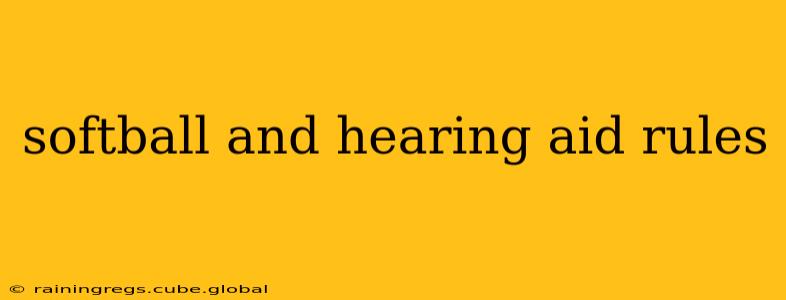Softball is a dynamic sport requiring intense focus and quick reactions. For players who rely on hearing aids, ensuring both safety and fair play necessitates understanding specific rules and considerations. While there isn't a universally standardized set of rules regarding hearing aids in softball across all leagues, this guide will address common concerns and best practices to ensure a safe and enjoyable game for all participants.
What are the official rules regarding hearing aids in softball?
There isn't a specific, universally enforced rule governing hearing aids in softball at the professional, collegiate, or even many amateur levels. This means the responsibility often falls on the individual player, their coach, and potentially the league officials to ensure safety and fairness. The focus is typically on ensuring the hearing aid doesn't present a safety hazard to the player or other participants.
Can I play softball with a hearing aid?
Yes, you can generally play softball with a hearing aid, provided it's secured properly and doesn't pose a risk. However, it's crucial to take precautions:
- Secure Fit: Ensure your hearing aid is firmly in place and unlikely to dislodge during sudden movements or impacts. Consider using retention cords or other securing methods.
- Protective Gear: While not always explicitly required, wearing a helmet is strongly recommended to protect both your head and your hearing aid.
- Communication with Coaches and Teammates: Clearly communicate your hearing aid use to your coach and teammates, especially if you have any specific needs or concerns. This ensures they understand any limitations and can adapt their communication accordingly.
- League Specific Rules: Always check with your specific softball league for any local rules or guidelines regarding hearing aids. Some leagues might have specific recommendations or restrictions.
Are there any safety concerns associated with wearing a hearing aid while playing softball?
The primary safety concerns revolve around the potential for damage to the hearing aid itself or injury to the wearer. These include:
- Impact Damage: A direct hit to the head could damage the hearing aid or even cause injury to the ear.
- Loss of the Hearing Aid: A poorly secured hearing aid could be lost during play.
- Moisture Damage: Sweat and rain can damage some hearing aids. Consider using waterproof or water-resistant models or protective coverings.
What type of hearing aid is best for playing softball?
The ideal hearing aid for softball is one that offers a secure and comfortable fit, preferably with features that minimize the risk of damage. Features to consider include:
- Secure Retention: Look for hearing aids with features designed to prevent them from easily falling out.
- Durability: Choose a hearing aid known for its robustness and resistance to damage.
- Water Resistance: Consider a water-resistant or waterproof model to protect against sweat and rain.
- Open-fit hearing aids: These often have a better fit and are less likely to fall out. However, they may offer slightly less protection than in-the-ear devices.
What should I do if my hearing aid gets damaged during a softball game?
If your hearing aid becomes damaged during a softball game, contact your audiologist immediately. They can assess the damage and advise on repairs or replacement options. Depending on the severity of the damage, your insurance might cover the repair or replacement costs.
How can I protect my hearing aid during a softball game?
Beyond choosing a durable and well-fitting hearing aid, you can take several steps to protect it during a softball game:
- Use a retention cord: This will prevent the hearing aid from falling out completely even if it's slightly dislodged.
- Wear a helmet: This offers crucial protection to your head and hearing aid from impacts.
- Consider protective coverings: Some covers are available to help shield the hearing aid from sweat and dust.
This comprehensive guide addresses many common questions about playing softball with a hearing aid. Remember to prioritize safety and communication to ensure a positive and enjoyable experience. Always check with your specific league for any specific regulations or recommendations.
